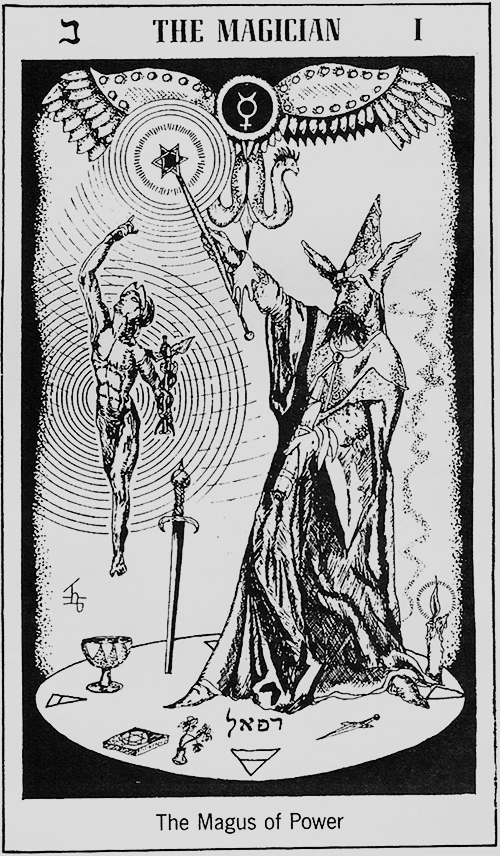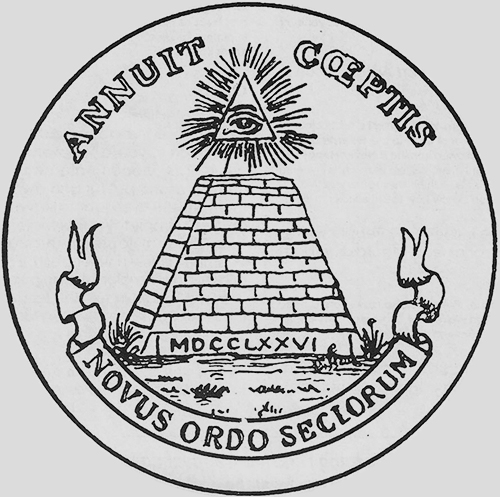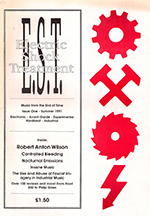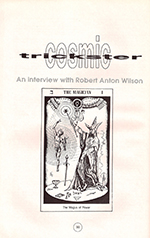Cosmic Trickster
An Interview with Robert Anton Wilson
WHATEVER else you may think about Robert Anton Wilson, he is a gentleman. There is no other term for a man who can come off stage after speaking for two hours, jet-lagged and short of sleep, and grant an interview to a young writer in a large leather jacket. I am still amazed that he was prepared to talk to me. Perhaps it was the look in my eye; perhaps the copy of Fortean Times in my hand. Perhaps it was that I was dropping the names of four mutual friends including Robert Shea as heavily as possible. Perhaps it was that I appeared very stoned and possibly dangerous.
I wasn’t actually stoned; but I was flying high on an assortment of antibiotics and cough remedies. Nevertheless, it gave the experience of sitting in a hotel bar next to one of the most original writers of the twentieth century a few novel twists. A TV set showing Vic Reeves’ Big Night Out behind me did not help my state of mind at all.
In a way, the following interview can be regarded as medicine fighting a gallant but losing battle against jet-lag. Facts, if you need them, are as follows. The interview was conducted at around 10.45pm on Wednesday 27th February 1991, and was recorded on an Aiwa HF-S 150. On the right stereo channel: a white-haired American claiming to be Robert Anton Wilson, with a slow easy voice and a deep laugh full of enjoyment. On the left: James Wallis, with a cough.
![]()
Quite a lot of the people in the hall tonight seemed to treat you as a guru or prophet. Do you have any problems with that?
Robert Anton Wilson: I keep trying to blow that up by making fun of it, by talking about my own fallibility and stupidity. It seems … well, some people turn movie stars into gurus. It doesn’t even mean you have any intelligence, it just means that a lot of people need gurus of some kind or another.
I suppose in a sense your books like Illuminatus!, being the first – well, not the first serious work but the first in-depth work on conspiracy theories have made you someone who is to be respected and looked up to.
Robert Anton Wilson: I suppose so, but it’s also made me a target for paranoia by a lot of conspiracy buffs who can’t explain what I’m doing except on the assumption that I’m a Government agent assigned to confuse them.
I know I’ve heard Kerry Wendel Thornley described as the most paranoid man in America.
Robert Anton Wilson: Just about. He was one of the first to decide I was a Government agent, or one of the first I know about.
It would be pointless to ask if you are a Government agent, of course.
Robert Anton Wilson: Well, I sometimes wonder. You know the CIA slang for somebody they’re using who doesn’t know he’s being used? They call that a “useful idiot”. Those writers who get exclusives from congressmen, and they have no idea the congressman is working for the CIA and the exclusive is a myth they’ve invented that they want to get into print. If the journalist takes it, they’re a useful idiot. So of course I have to ask myself occasionally, have I become a useful idiot yet? (laughs)
“It’s very hard to have any communication from a one-up position. Communication is only possible between equals. As an example, is there anybody here who has ever told the complete truth to anybody from the government? You can’t afford to do it. Whenever anyone’s in a one-up position you tell them what they want to hear.”
In that you’re spreading disinformation and ridiculing things?
Robert Anton Wilson: Yeah, so I gotta keep wondering about that.
To what extent are you involved with the Discordians and the Church of the Subgenius these days?
Robert Anton Wilson: I’m involved to some extent; I’m involved in a lot of things to some extent. I got a story in the latest Subgenius anthology, I put Discordian references in my books hoping to spread Discordianism, I meet other Discordians frequently. Every time I’m in Dallas I’m on the Hour of Slack, the Subgenius radio show.
To what extent do you think you’ve become a part of the New Age movement? The stalls in the atrium tonight seemed to be concerned with a lot of New Age material, and to an extent the way you’ve been talking about Virtual Realities and mind expansion you seem to be almost a forerunner of the movement.
Robert Anton Wilson: The Berkeley mob once called Leary and me “the counter-culture of the counter-culture.” I’m some kind of antibody in the New Age movement. My function is to raise the possibility, “Hey, you know, some of this stuff might be bullshit.”
You don’t seem to take very much of it very seriously.
Robert Anton Wilson: Some of it I do take seriously. In Prometheus Rising and Quantum Psychology I’m definitely trying to teach the reader how to change their own consciousness so they don’t need a guru to do it for them. I’m very definitely a spiritual anarchist.
To get back for a moment to the nuts and happenings that seem to surround you. two things focused my attention quite recently. The first thing was that someone held up a fast-food restaurant demanding $100,000, a helicopter and a copy of The Widow’s Son.
Robert Anton Wilson: That was in Atlanta, Georgia. The character’s name was “Noid”. I wrote a little story about it in my newsletter, I said that “Noid got annoid and perhaps a little paranoid too.”

Did he get the copy of The Widow’s Son?
Robert Anton Wilson: No, no, he surrendered finally, he let all the hostages go and surrendered. He was protesting a pizza commercial which he thought was insulting him.
The other thing is something I’ve only heard rumors about: a German hacker who was using the name Hagbard Celine.
Robert Anton Wilson: Hagbard, yes. He penetrated the entire American defence establishment. He got all through from the Naval database in Norfolk. Once he busted into that he was able to get into everything; the air command, the Lawrence Livermore laboratories where they were working on super-super weapons. He was browsing through everything, he was at it for months before they caught up with him.
What I heard was that he was probably killed by CIA operatives.
Robert Anton Wilson: The German police ruled it was suicide, but everybody in Germany that I know tells me that the CIA bumped him off. They haven’t come looking for me yet.
You have talked about the extent to which you are responsible for what you have written and the way that people treat them. Do you believe that you have any responsibility for people like this using your names and your ideas to do things which are not so much illegal or immoral as just plain stupid?
Robert Anton Wilson: That’s a very hard question. How can you answer a question like that without sounding pompous? I think it’s the writer’s responsibility – any sentence that begins “I think it’s the writer’s responsibility” sound pompous! I think it’s the writer’s responsibility to communicate as clearly as possible, which may be rather hard if you’re dealing with a complex subject, your clarity may not seem like clarity at first, it may require some work on the part of the reader. But you are not responsible for every nut who gets hold of your pages because there is no defence against it, you can’t prevent it. How many nuts have been inspired by the Bible? Leaving out the Inquisition and the Crusades and so on, every couple of years there’s a case in America of some nut who’s reading the Bible and suddenly goes out and starts shooting all the fornicators or something crazy like that. God tells him who the fornicators are so he can shoot them. And it’s happened to all sorts of writers. Thomas Wolfe has a story about a guy who goes crazy and starts shooting everybody in town; and a fellow named Howard Unra in New Jersey read that book and went out and started shooting people. It certainly wasn’t Thomas Wolfe’s intent and I don’t see how he could be blamed for it. It’s the fault of public libraries and bookstores for not keeping these books out of the hands of nuts (laughs).
“I very much think I’m a continuation of the surrealist tradition. The original motto of the surrealists was ‘Total transformation of mind and all that resembles it’ and that’s very much the spirit of my books. The first surrealist show where the audience came in and they found a car in the garden where it was raining inside the car but not outside it, and they passed on and came to a sign by Andrew Breton that said ‘Dada is not dead, watch your overcoat’. At that point those people were in an alternative reality. I think it’s too late for art in the old sense. We need magic, and the surrealists were masters of putting the magic back into art, which is also what I’m trying to do.”
So if your writings do have an intention, what is it? Obviously with books like Quantum Psychology, their intention is quite clear but is there a subtext? Do you want to alter the mind of the late twentieth century?
Robert Anton Wilson: And the twenty-first, yeah. At my most ambitious I want to make as big a revolution as Voltaire or Marx or Nietzsche, only I hope mine will be totally wholesome. Of course, that’s hoping for a lot. On a more modest level, I just hope I give some people some good laughs, cheer them up and make them a little more optimistic because the world is suffering from terrible depression. It’s a global illness.
How do you see the Illuminatus! trilogy these days? Has it become something of a millstone round your neck?
Robert Anton Wilson: No, no I’m still delighted with it … I can’t write a formula book. I tried once, that was Masks of the Illuminati. I started out to write an ordinary detective story, and then my imagination ran away with me and out came Masks Of The Illuminati which is a detective novel but hardly an ordinary one.
You seem to have a tremendous passion for James Joyce.
Robert Anton Wilson: Yeah, I’ve published several articles on James Joyce. I would have done more except that there’s not much money in writing about Joyce and I’ve got to have that somewhere in my consciousness when I’m writing. I can write a certain number of articles that I don’t get paid for, but most of my articles I have to think about getting paid for.
Was that partly what prompted you to go and live in Ireland, or was that a desire to get out of America?
Robert Anton Wilson: A little bit of both. I wanted to live in Ireland, not just because of Joyce but because of a lot of sentimental attachments to Ireland. And I wanted to get out of the United States because Ronald Reagan gave me nightmares. I said “If that guy ever gets elected I’m going to leave the country.” and I felt I was weaseling if I didn’t leave. And writers don’t pay tax in Ireland.

Did Ronald Reagan give you more or less nightmares than George Bush?
Robert Anton Wilson: Less. I told lots of people that Bush is going to be a lot worse than Reagan, and I’m getting a grim satisfaction out of seeing that prediction come true.
What do you think the prospects are for Dan Quayle getting elected in 1997?
Robert Anton Wilson: I don’t think he will. I could be wrong, the American voters continually horrify me but I don’t think they’ll go that far. I think what explains American politics is that the Democrats used to be the party of the poor, and then they sold out. Television did it. It takes $100m to run a campaign for president, $30m to run a campaign for the Senate. So both parties are in the bag, they’re both being financed by the multi-national corporations. And the poor have figured that out, there’s nobody that represents them and so they don’t vote. So the Republicans win all the time. It’s very hard to get a third party started in the United States, it’s too expensive. So most poor people and most intellectuals just don’t vote, they don’t have anybody representing them, the two parties are practically indistinguishable.
Do you have a message for British youth, or the world’s youth?
Robert Anton Wilson: I’m awfully tempted. All these people protesting the Poll Tax, they should read up on the Gordon Riots of 1780 and find out how it’s really done. Oh God. No, don’t print that. The police would be on you. I couldn’t resist saying it but don’t print it. Do I have a less inflammatory message? The world is controlled by belief systems – BS. Don’t believe totally in anybody’s BS. The second commandment is like unto the first: don’t believe totally in your own BS. That’s my message to the youth of the world.
Also the works of Robert Anton Wilson in a nutshell.
Robert Anton Wilson: Don’t believe in them totally, they’re all subject to revision. Anything can be sent back to the Rewrite department, or may even get followed into the It Never Happened department. I didn’t invent them, William Burroughs invented both of those departments. I think they’re very active, although most people don’t know how to get access to them.
“The thing I find most appealing is from Nietzsche, at the end of Zarathustra, where he says ‘This is my way. Do not ask for the way; the way does not exist. Go find your own way.’”
Do you have influences? People whose work you follow, or at least regard as important?
Robert Anton Wilson: Thomas Pynchon, William Burroughs. Bohm, Sheldrake, Nick Herbert, Fred Wolfe, Alan Ginsberg, Terry Southern if he’d only write something again.
How do you regard Pynchon as important? Obviously he’s a conspiracy theorist …
Robert Anton Wilson: We have a lot in common. It’s one of those things, like Darwin and Wallace, when the time is right a couple of people are going to be saying pretty much the same thing. There are enough differences between Pynchon and me that I think I’m a little more than just an echo of Pynchon. At least I like to believe that. Shea and I were finished with Illuminatus! when we read Gravity’s Rainbow and then on the rewrite we deliberately threw in a couple of references to it, but we had worked out the structure on our own, mostly on the basis of the nut mail that Playboy gets.
What was your involvement with Playboy?
Robert Anton Wilson: Shea and I were working on the Playboy Forum, that being a discussion between the editors – that being Shea and me at that time – about the basic ideas of civil liberties and the limitations of government and the general libertarian philosophy. And since we were attacking the Government for attacking the rights of the individual on all sorts of issues like drugs and abortion, consensual sex between adults, we were getting an awful lot of nut mail from people who thought they were being persecuted by the Government, imagining the most baroque paranoid fantasies. And we started thinking of how all these people had different theories about what was wrong with the world, and suppose they were all right? Suppose all these conspiracy theories were going on at once? (laughs) So we bounced that around for a few drinking parties and then suddenly Shea said “You know, we could turn this into a novel.” We should really have dedicated the book to all the paranoids, from whom we learned so much.
How do you see the future? Is it rosy, is it indeterminate?
Robert Anton Wilson: I guess it’s indeterminate, but the possibility of a rosy future is at least as real as the possibility of a black future, so I prefer to put my imagination and will and energy into making the rosy future come true.
![]()
Outro
Just in case the above didn’t actually mean very much to you, a few words of outroduction are in order. Robert Anton Wilson is famous for many reasons, but far and away the largest of them is his 1975 collaboration with Robert Shea on the conspiracy theory trilogy, Illuminatus!. This fictional journey through late sixties counterculture is influenced by most of the theories regarding global manipulation current at the time, and it in turn influenced many of the theories that came afterwards. And it’s an astonishingly good read too.
He has written numerous other novels exploring the occult, conspiracies, quantum physics and whatever else rattles around inside his brain, including the Schrodinger’s Cat trilogy, Masks of the Illuminati (starring Albert Einstein, James Joyce and Aleister Crowley) and the still unfinished Historical Illuminatus trilogy (of which The Widow’s Son is part), all excellent books.
Wilson has also written several books explaining his view of personal development. These include Ishtar Rising, Cosmic Trigger (volume two of which is just out), Quantum Psychology, and with Koopman and acid-guru Leary, Neuropolitics. Throughout these, Wilson is influenced both by the optimistic acronym S.M.I².L.E (Space Migration, Intelligence Increase, Life Extension), and by his wide knowledge of occult systems. His beliefs combine a loathing for dogma with an optimistic faith in the ability of modern technology to solve all, partly by providing opportunities for us all to expand our minds.
Some view him as a technophiliac masturbator, filling his novels with naive personal obsessions, others see instead a fringe genius, unafraid to explore seriously areas that much of society still regards as science fiction … Did the real Robert Anton Wilson stand up?
[The above interview has already appeared in shorter form elsewhere. This is an almost unadulterated version.]
(Q: Do you believe yourself?)
I’ve been fighting this for years. There is a tendency when at times I lapse into believing in what I say, but it doesn’t happen very often and I think I’m conquering that bad habit. It’s a habit I deeply want to get rid of, because I’ve discovered that people who do believe what they say are pretty thickheaded and difficult to deal with, and I don’t want to be another one of them
…
Between the time of Christ and Leonardo, information doubled once. Between Leonardo and James Watt it doubled again. Between James Watt and the Wright Brothers it doubled again. That’s at the rate of 1500, 250 and 150 years. Information had doubled in fifty years between 1900 and 1950. Now it’s doubling every eighteen months. If you project that forward you do find, as Terence McKenna did, that information seems to be going XXXXX around 2012. I don’t know what the hell that means concretely, so I’ll take Terence’s metaphor. He says it means our encounter with a transcendental object. I don’t know what the hell that means, but it’s better than not having any image at all of what we’re heading towards …
We can start reversing the damage done to the rainforests by printing our books on good honest hemp paper again. The Magna Carta was written on good honest hemp. The United States constitution was written on hemp too. All books were printed on hemp paper up until the 1930s. That’s why you can look in your Grandfather’s library, if you know where your grandfather’s library is, and you can read the books although they’re over 100 years old. In the Long Room at Trinity College you can see the Book of Kells from the eighth century, Gulliver’s Travels from the eighteenth century, all these books preserved because they’re printed on good honest hemp. Then the American congress that some people get happy when they smoke hemp, and Harry Enslinger told them that black people look white people in the eye when they smoke hemp, and that shows they’re completely out of their heads and don’t know their place any more. So Congress passed a law against it. Now our books are printed on this lousy wood paper and they all fall apart, books fall apart in two or three years, the forests are being destroyed, the greenhouse effect is building up, all because the U.S. Congress persuaded the rest of the world to go along with them on this universal narcotics convention saying “Nobody nowhere can grow no more hemp nohow.” So now we’ve got this ecological catastrophe and our books are falling apart. It’s time to go back to good honest hemp!
You can also make fuel out of hemp; hemp seeds are the richest source of oil on the planet. We can run our cars on hemp seed. Henry Ford was getting ready to convert to hemp seed cars when Congress made hemp illegal. Hemp is totally non-polluting; you can have as much traffic in London as you have now but with none of the pollution because they’re all running on good honest hemp!

Cosmic Trickster: An Interview with Robert Anton Wilson
by James Wallis appeared in Electric Shock Treatment, Issue One (Summer 1991).

